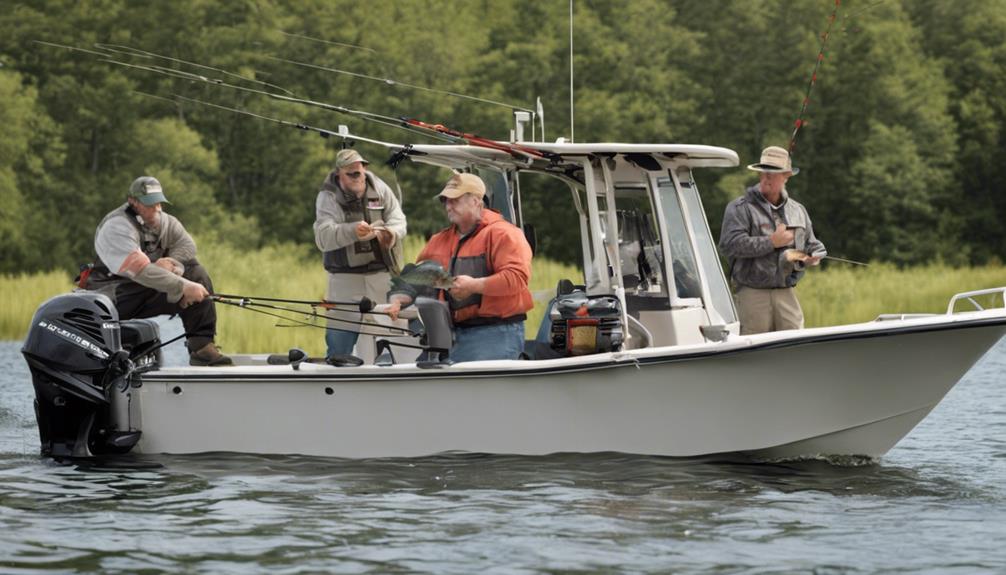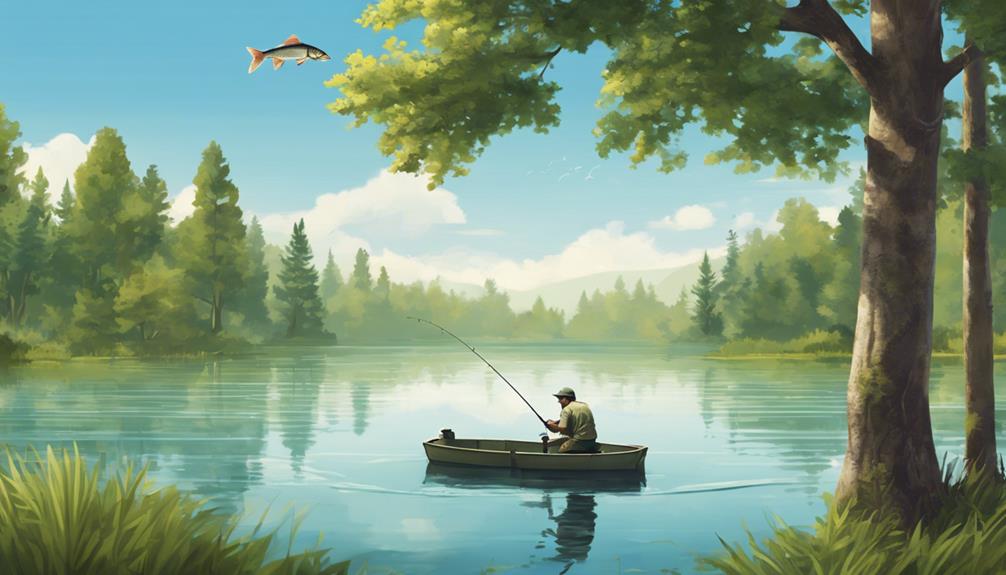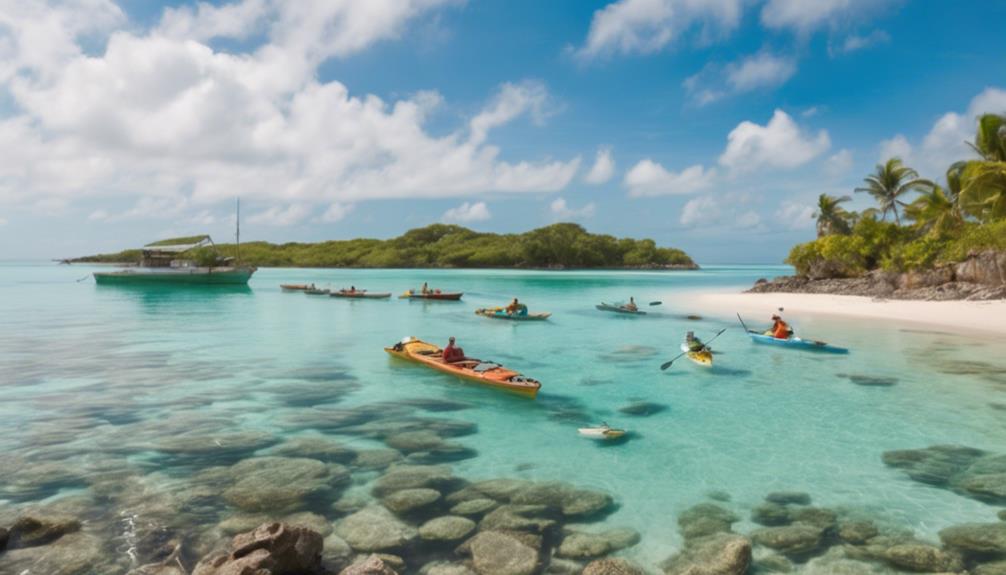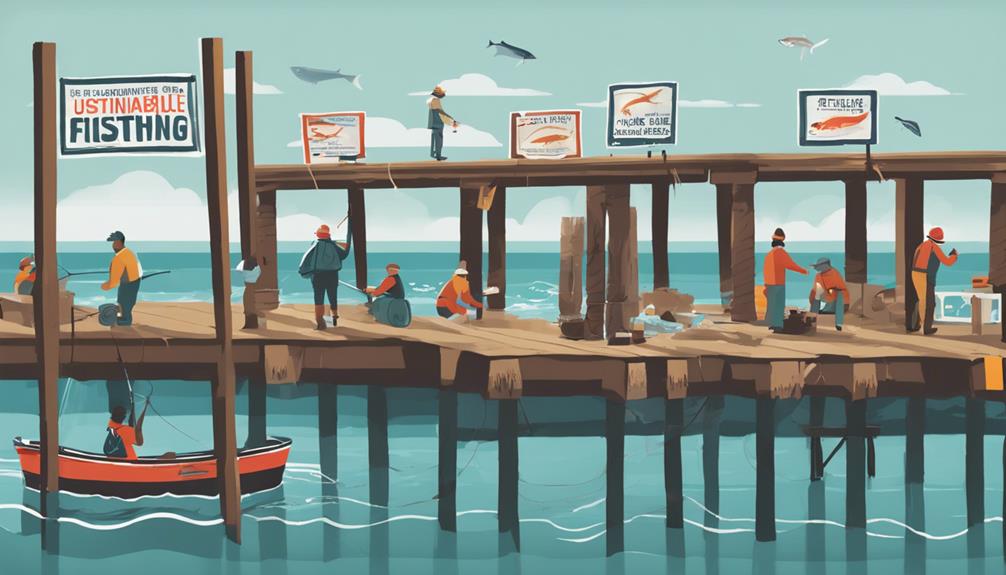Imagine you're out on the open sea, casting your line in hopes of a big catch. Just like a puzzle waiting to be solved, the ecosystem beneath the waves is a delicate balance that requires your understanding and care.
As an angler, your impact on marine life is significant, and there are ways you can become a steward of the ocean. By learning marine conservation techniques, you not only enhance your fishing experience but also contribute to the preservation of our precious underwater world.
Importance of Marine Conservation
Understanding why marine conservation is crucial can significantly impact the way anglers approach their practices. By being aware of issues like ocean acidification and the importance of marine biodiversity conservation, anglers can make more informed decisions to help protect the ocean ecosystems they rely on for their hobby. Ocean acidification awareness is essential because it affects the entire marine food chain, from tiny plankton to large predators, ultimately impacting the fish anglers aim to catch.
Additionally, being conscious of plastic pollution prevention is crucial. Anglers can play a significant role in reducing plastic waste by properly disposing of their trash and participating in beach clean-up efforts. Plastic pollution not only harms marine life directly but also contributes to the degradation of habitats where fish breed and seek shelter.
Furthermore, making sustainable seafood choices is vital for the long-term health of marine populations. Anglers can support sustainable fishing practices by choosing to target species that are abundant and well-managed, as well as avoiding fish that are overexploited or caught using destructive methods. By making these choices, anglers can help ensure that fish populations remain healthy and diverse for future generations to enjoy.
Sustainable Fishing Practices
To ensure the preservation of marine ecosystems and the longevity of fish populations, anglers must adopt sustainable fishing practices that prioritize conservation and responsible resource management. Ethical harvesting and responsible angling are fundamental aspects of sustainable fishing practices that every angler should adhere to. Ethical harvesting involves only taking what you need and can use, avoiding wasteful practices like overfishing or targeting endangered species. By respecting catch limits and size regulations, anglers can contribute to maintaining balanced fish populations and healthy marine ecosystems.
Responsible angling goes beyond just catching fish; it involves understanding and respecting the environment in which you're fishing. This includes properly disposing of trash, using environmentally friendly gear, and minimizing your impact on marine habitats. Anglers should also stay informed about local regulations and conservation efforts to ensure they're fishing in a sustainable manner.
Incorporating sustainable fishing practices into your angling routine not only helps protect the marine environment but also ensures that future generations can enjoy the thrill of fishing. By being mindful of your actions and making conservation a priority, you can make a positive difference in preserving our oceans and the diverse species that call them home. Remember, every small effort counts towards safeguarding our marine ecosystems for the future.
Catch and Release Techniques
When practicing catch and release techniques, ensure you handle the fish with care to maximize its chances of survival. Proper handling is crucial in minimizing stress and injury to the fish. Always wet your hands before touching the fish to protect its slimy coating, which acts as a barrier against infections. Avoid using rough surfaces like dry hands or towels that can strip away this protective layer. Additionally, support the fish horizontally, especially larger ones, to prevent damage to their internal organs.
Ethical practices play a significant role in catch and release fishing. Use barbless hooks to facilitate an easier and less harmful hook removal process. If the fish is deeply hooked, consider cutting the line rather than causing further harm by trying to retrieve the hook. Minimize air exposure by keeping the fish in the water as much as possible. This is particularly important for species like trout, which are more sensitive to lack of oxygen.
Selecting Environmentally-Friendly Gear
Ensure your fishing gear is environmentally friendly by choosing options that minimize harm to marine ecosystems and wildlife. When selecting eco-friendly equipment, opt for gear made from sustainable materials like bamboo, recycled plastics, or lead-free weights. These choices reduce the impact on marine life and habitats. Responsible angling practices also include using biodegradable fishing line instead of traditional nylon lines that can persist in the environment for hundreds of years. By making these simple switches, you can actively contribute to the conservation of marine ecosystems.
Another essential aspect of selecting environmentally-friendly gear is choosing non-toxic bait and lures. Lead-based weights and lures pose a significant threat to marine animals if ingested. Instead, look for alternatives like tungsten or steel weights and natural bait options. These changes not only benefit the environment but also promote safer interactions between anglers and marine life.
Additionally, consider the durability and longevity of your gear. Invest in high-quality equipment that will last longer, reducing the need for frequent replacements and minimizing waste. Proper maintenance of your gear is also crucial to extend its lifespan and prevent unnecessary disposal of fishing equipment into the oceans.
Understanding Fish Habitats
Select gear that aligns with the specific habitats of the fish species you're targeting for a successful angling experience. Understanding fish habitats is crucial for effective angling and marine conservation efforts. By knowing where different species reside and feed, anglers can minimize their impact on sensitive ecosystems and help promote habitat restoration and ecosystem preservation.
Here are three key points to consider:
- Research the Habitat: Before heading out, research the specific habitats preferred by the fish species you aim to catch. Understanding whether they prefer rocky areas, seagrass beds, or open waters will help you select the right gear and fishing techniques.
- Use Proper Lures and Baits: Choose lures and baits that mimic the natural prey found in the fish's habitat. This not only increases your chances of a successful catch but also reduces the risk of unintentionally harming non-target species.
- Practice Catch-and-Release: If possible, practice catch-and-release fishing to help preserve fish populations and their habitats. Handling fish properly and releasing them promptly can significantly improve their chances of survival, contributing to ecosystem preservation efforts.
Participating in Beach Cleanups
Participate in beach cleanups to actively contribute to marine conservation efforts and protect coastal ecosystems. Coastal restoration initiatives are crucial in maintaining the health of our oceans. By joining beach cleanups, you directly impact the preservation of marine habitats and wildlife. These initiatives not only help in waste management solutions but also aid in preventing plastic pollution from entering the oceans. Engaging in community-led cleanups fosters a sense of responsibility towards the environment and encourages others to participate in conservation activities.
Beach cleanups are effective community engagement strategies that bring people together for a common cause. They provide a hands-on approach to environmental stewardship and raise awareness about the importance of keeping our beaches clean. By actively participating in these events, you play a vital role in safeguarding coastal ecosystems for future generations to enjoy.
Through your involvement in beach cleanups, you directly contribute to the protection and preservation of marine life. Your actions have a ripple effect, inspiring others to take part in coastal restoration initiatives. By working together to combat pollution and promote sustainability, we can create a cleaner and healthier environment for both marine species and humans alike. So, roll up your sleeves, grab a trash bag, and make a difference by being part of the solution.
Supporting Marine Protected Areas
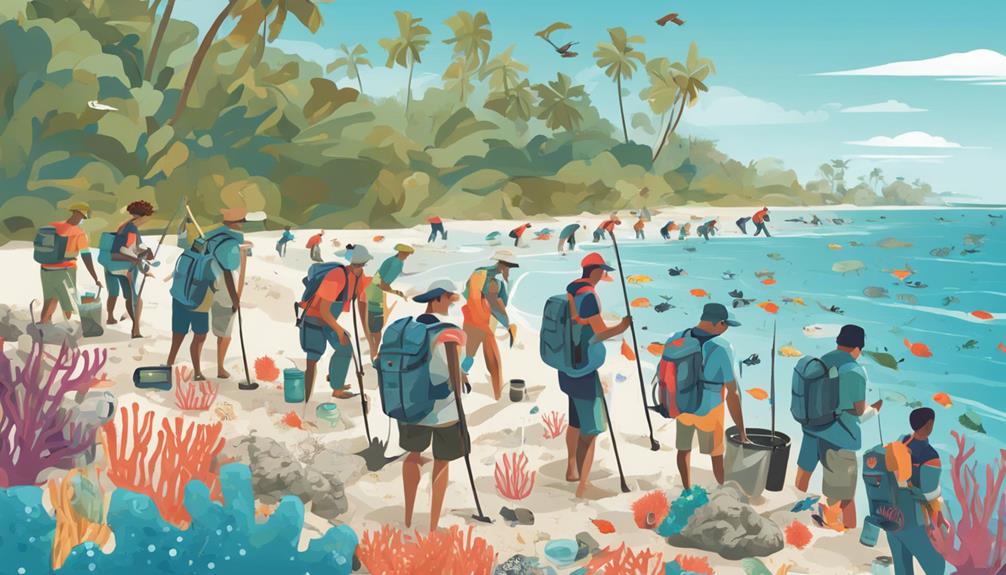
Consider advocating for the establishment and expansion of Marine Protected Areas to bolster marine conservation efforts and safeguard ocean biodiversity. Marine Protected Areas (MPAs) are vital for preserving marine ecosystems and ensuring the longevity of marine species. By supporting these areas, you can actively contribute to the protection of our oceans and the diversity of marine life they harbor.
Here are three crucial ways supporting Marine Protected Areas can make a difference:
- Community Engagement: Encouraging local communities to get involved in MPA initiatives fosters a sense of stewardship and responsibility towards marine conservation efforts. When communities are actively engaged in protecting these areas, the impact is more significant and sustainable.
- Sustainable Tourism: MPAs play a crucial role in promoting sustainable tourism practices. By advocating for the establishment and maintenance of MPAs, you can help ensure that tourism activities in these areas are environmentally friendly and don't harm marine habitats.
- Marine Protection: Supporting the creation and growth of MPAs is essential for safeguarding marine ecosystems from threats such as overfishing, pollution, and habitat destruction. These areas serve as sanctuaries where marine life can thrive undisturbed, contributing to the overall health of our oceans.
Advocating for Policy Changes
To further advance marine conservation efforts, it's crucial to advocate for policy changes that support the sustainable management of marine resources and the protection of marine habitats. Policy reform plays a vital role in shaping how our oceans are managed and protected. By actively engaging in advocating for policy changes, anglers can help ensure the long-term health and sustainability of marine ecosystems.
One key aspect of advocating for policy changes is pushing for government support for marine conservation initiatives. Governments have the power to enact and enforce regulations that can significantly impact marine environments. By lobbying for policies that promote sustainable fishing practices, establish marine protected areas, and reduce pollution, anglers can contribute to the preservation of marine biodiversity.
Additionally, advocating for policy reform can help address issues such as overfishing, habitat destruction, and climate change impacts on marine ecosystems. Through collective action and collaboration with policymakers, anglers can influence decision-making processes that lead to more effective marine conservation strategies.
It is essential for anglers to stay informed about relevant policies, participate in public consultations, and work with conservation organizations to amplify their voices. By actively advocating for policy changes that prioritize marine conservation, anglers can play a crucial role in safeguarding the health and diversity of our oceans for future generations.
Frequently Asked Questions
What Are the Common Threats to Marine Habitats That Anglers Should Be Aware Of?
When fishing, be mindful of common threats to marine habitats. Coral reef degradation and overfishing disturb the delicate balance of marine ecosystems.
Plastic pollution and oil spills harm marine life and habitats. Understand your impact and take steps to fish responsibly.
Protecting marine environments is crucial for the health of our oceans. Be a responsible angler and help preserve the beauty and biodiversity of our seas.
How Can Anglers Contribute to Scientific Research and Data Collection for Marine Conservation Efforts?
To contribute to scientific research and data collection for marine conservation efforts, you can engage in citizen science projects. By participating in these initiatives, you gather valuable data that scientists use to monitor marine ecosystems.
Sustainable fishing practices also play a significant role in conservation efforts. Your responsible fishing habits help protect marine habitats and ensure the long-term health of ocean ecosystems.
Joining forces with scientists and practicing sustainable fishing benefits marine conservation efforts greatly.
Are There Specific Regulations or Guidelines for Anglers to Follow in Order to Minimize Their Impact on Marine Ecosystems?
To minimize your impact on marine ecosystems, follow regulations and guidelines focused on sustainable fishing practices. Conservation education is key to understanding the importance of marine ecosystem preservation.
Embrace responsible angling techniques like catch and release, using biodegradable gear, and respecting protected areas. By adhering to these rules, you can enjoy fishing while helping safeguard the fragile balance of marine life for future generations.
How Can Anglers Support Local Conservation Organizations and Initiatives in Their Community?
To support conservation efforts in your community, engage with local organizations. Attend events, volunteer your time, or donate to their initiatives. By participating actively, you can make a tangible impact on marine ecosystems.
Community engagement plays a crucial role in preserving our natural resources. Show your support for conservation organizations and help protect the environment for future generations.
Get involved and make a difference in your local community today!
What Are Some Innovative Technologies or Practices That Anglers Can Use to Reduce Their Carbon Footprint While Fishing?
To reduce your carbon footprint while fishing, you can adopt innovative practices and use eco-friendly gear. Consider opting for electric boats or kayaks, which are quieter and don't release emissions.
Switch to biodegradable fishing lines and environmentally friendly bait to minimize your impact on aquatic life.
Embrace sustainable practices like catch-and-release fishing and proper disposal of fishing waste to ensure the preservation of marine ecosystems for future generations.
Conclusion
Now that you've learned about marine conservation techniques for anglers, remember to always practice sustainable fishing, use environmentally-friendly gear, and support marine protected areas. By taking these steps, you can help protect our oceans and ensure a healthy future for marine life.
Get involved in beach cleanups, advocate for policy changes, and continue to educate yourself and others on the importance of preserving our marine ecosystems. Together, we can make a difference in conserving our precious ocean resources.
